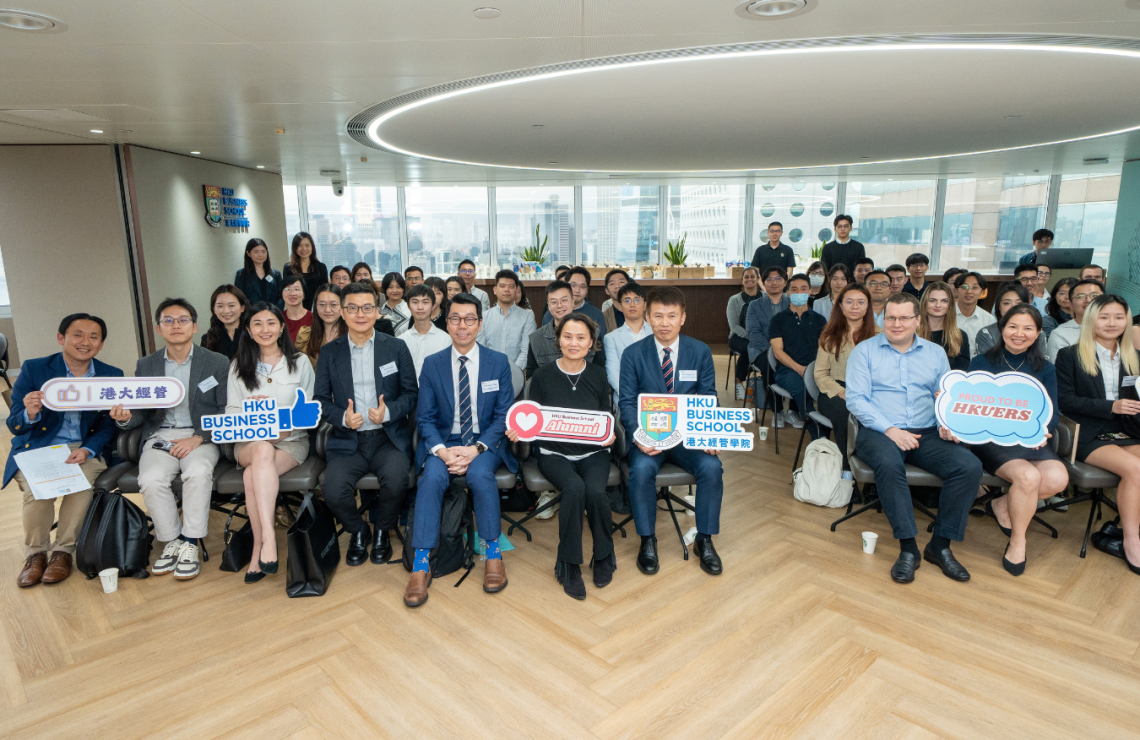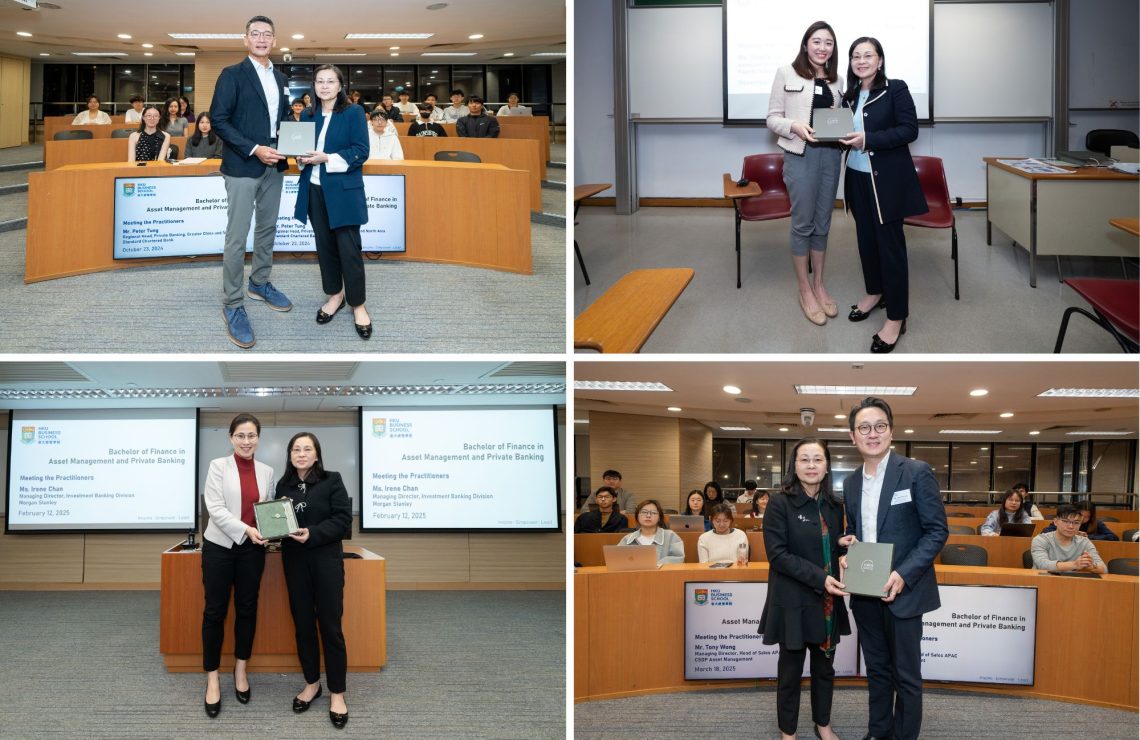HKU Business School’s Inaugural Distinguished Lecture on Chinese Economy Provides new perspectives through rigorous academic analysis
In the inaugural lecture of the HKU Business School Distinguished Lecture Series on the Chinese Economy, keynote speaker Dr Jiantang Ma, Standing Committee Member and Deputy Director of the Economic Affairs Committee of the Chinese People’s Political Consultative Conference, former Party Secretary and Vice President of the Development Research Center of the State Council, and former Director of the National Bureau of Statistics; and guest speakers Dr Dongsheng Chen, Founder, Chairman and CEO of Taikang Insurance Group, and Professor Zhenhua Mao, Founder of ZhongChengXin (HK) Investment Services Limited, and Professor of Practice of HKU Business School,presented thoughtful insights into some of the most pressing challenges facing Chinese economy. The lecture, held at HKU iCube on 1 April, was attended by a diverse audience of business leaders, academics, alumni and students, receiving over a hundred attendees.
Professor Hongbin Cai, Dean and Chair of Economics of HKU Business School, said in his welcoming remarks, “We established HKU Institute of China Economy in 2022. Today, we proudly introduce our inaugural HKU Business School Distinguished Lecture Series, inviting Dr Jiantang Ma, Dr Dongsheng Chen, and Professor Zhenhua Maoas our honourable speakers to kick off the series. We are also pleased to announce the launch of our first publication titled ‘Chinese Economy: Analysis and Prospects – 2023’. The seven research articles analyse key issues related to macroeconomics, finance, employment, environmental protection, investment and entrepreneur confidence. With profound understanding of the Chinese economy, our professors conducted meticulous research and academic analysis, addressing various significant economic issues and providing insightful policy recommendations. Leveraging the excellent platform of HKU Institute of China Economy, we will launch dynamic and thought-provoking lectures, publications, forums, and international academic exchange conferences on the Chinese economy, and continue to carry out and advocate in-depth research, with an aim of developing HKU Business School into a world-class academic centre for research on Chinese economy.”
Dr. Jiantang Ma said in his keynote speech, “In 2022, China faced a turbulent international environment and challenges in maintaining stability as well as keeping reform and development. Under the leadership of the Central Committee of the Communist Party of China President Xi Jinping, we upheld the general principle of pursuing progress and ensuring stability, and proactively implemented scientific and precise policies on macro-economy, introduced active and appropriate fiscal, monetary, employment and poverty alleviation policies, overcame unexpected shocks and difficulties such as supply and demand contraction, and weakening expectations. We achieved major economic objectives and the Chinese economy demonstrated strong resilience. This year, we are going to overcome difficulties with confidence by leveraging our strong foundation in economic and social development. Looking ahead, under the strong leadership of President Xi Jinping, the national economy will definitely continue to recover and achieve the goal of overall economic growth. In accordance with the specific arrangement of last year’s Central Economic Work Conference and this year’s Two Sessions, we will focus on expanding domestic demand, working unswervingly to support the development of the public sector. We will promote the recovery of the national economy through accelerating the development of the modern industrial system, optimising the business operation environment, facilitating high-standard opening-up, as well as preventing financial risk, so as to mark new achievements in building China into a modern socialist country.”
Dr Dongsheng Chen, Founder, Chairman and CEO of Taikang Insurance Group, shared his insight into Chinese modernisation and entrepreneurship. Dr. Dongsheng Chen said, “An efficient administrative system, a socialist market economy and the establishment of a rule-of-law society are the three keys to the success of exploring Chinese modernisation since the reform and opening up of China. This contributed to the development of six economic sectors and networks, including state-owned economy, export-oriented manufacturing and supply chain system, internet and technology, infrastructure and virtual economy, as well as the ecological economy of “dual carbon + technology” and the people’s livelihood economy of “health + consumption”. Chinese entrepreneurs are the cornerstones of Chinese modernisation and national revitalisation. In view of the unprecedented changes unseen in a century, entrepreneurs should strive for healthy and high-quality development, by transforming from enclosure, barbaric growth, diversification, resource-consuming and high leverage in the past, to leading enterprises that focus on professionalism and core businesses, driven by efficiency and innovation.”
Professor Zhenhua Mao’s speech highlighted the downward shift of China’s economic growth platform and the pressure of a shrinking balance sheet. He said that despite China’s economy shows signs of recovery after the pandemic, downward pressure still exists in the medium-and-long term. Meanwhile, the pandemic and the relatively weak micro-entities increased the pressure on a shrinking balance sheet. It is necessary to be vigilant against the occurrence of a recession in the balance sheets of residents, enterprises, and the government. In view of the situation, he suggested that policies should focus on economic construction, adhering to reform and opening up, and promoting the increase of total factor productivity through continuous system reform. Also, he said that in order to ease the downward pressure on the economy, we have to overcome the pain points in terms of science and technology development, supply-side reforms, and expansion of domestic demand, so as to utilise the advantages of the Guangdong-Hong Kong-Macao Greater Bay Area. Professor Mao added that macro-control should maintain a dynamic balance between stable growth and risk prevention, which can be exchanged at a certain price in order to gain time and room for risk mitigation.
The lecture was followed by an inspiring and intriguing panel discussion, moderated by Professor Hongbin Cai. Panellists include Professor Shusong Ba, Managing Director and Chief China Economist of HKEX, Professor Zhiwu Chen, Chair Professor of Finance, Cheng Yu-Tung Professor in Finance and Director of Hong Kong Institute for the Humanities and Social Science, Dr Dongsheng Chen and Professor Zhenhua Mao. Their insightful sharing and vigorous discussion stimulated and engaged the audience with innovative ideas.
The key points of the “Chinese Economy: Analysis and Prospects – 2023” is detailed in Annex. Full version of the report can be accessed here.
Photo Caption
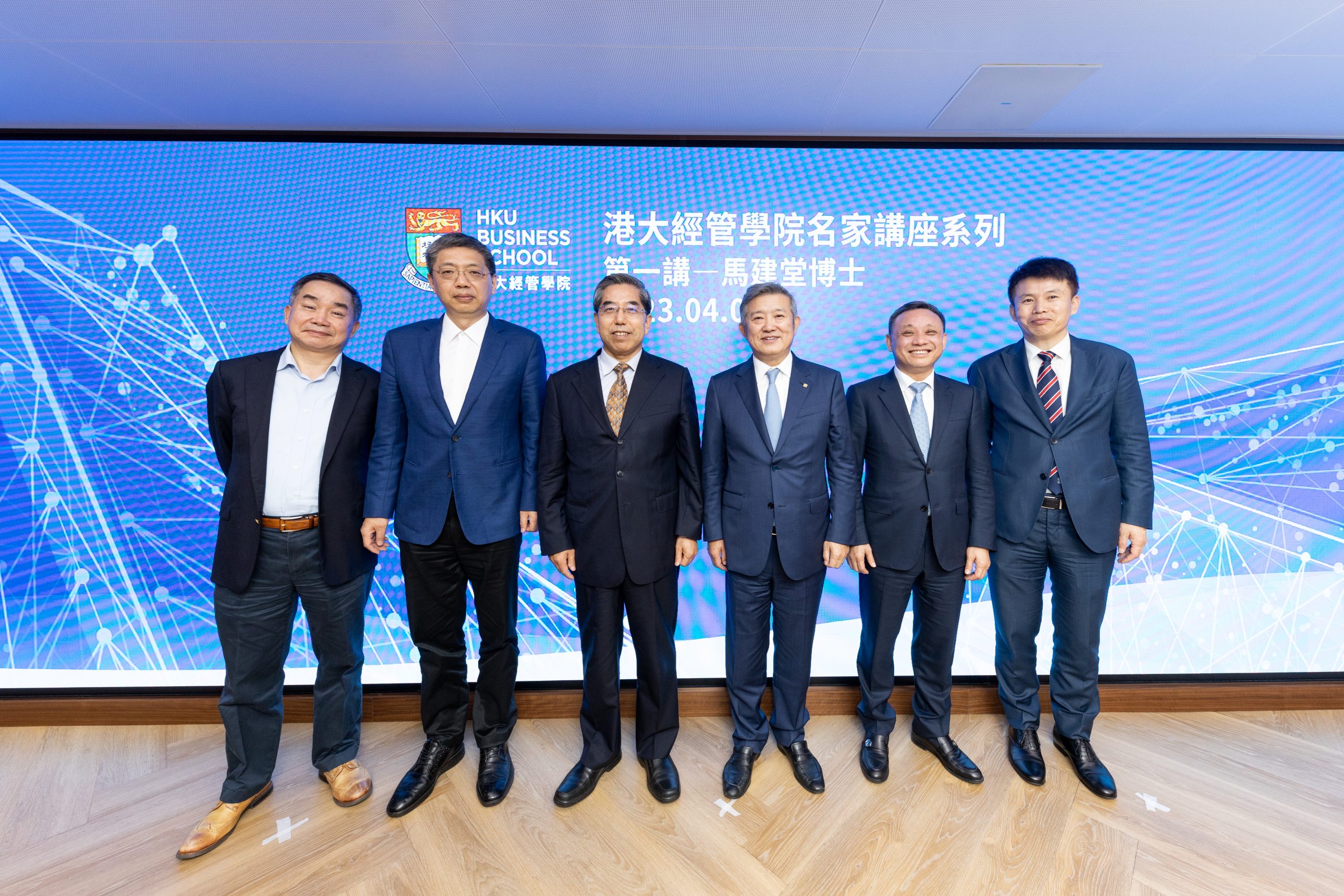
1. (From left) Professor Zhiwu Chen, Chair Professor of Finance, Cheng Yu-Tung Professor in Finance and Director of Hong Kong Institute for the Humanities and Social Science; Professor Shusong Ba, Managing Director and Chief China Economist of HKEX; Dr Jiantang Ma, Standing Committee Member and Deputy Director of the Economic Affairs Committee of the Chinese People’s Political Consultative Conference, former Party Secretary and Vice President of the Development Research Center of the State Council, and former Director of the National Bureau of Statistics; Dr Dongsheng Chen, Founder, Chairman and CEO of Taikang Insurance Group; Professor Zhenhua Mao, Founder of ZhongChengXin (HK) Investment Services Limited, and Professor of Practice of HKU Business School; Professor Hongbin Cai, Dean and Chair of Economics of HKU Business School.
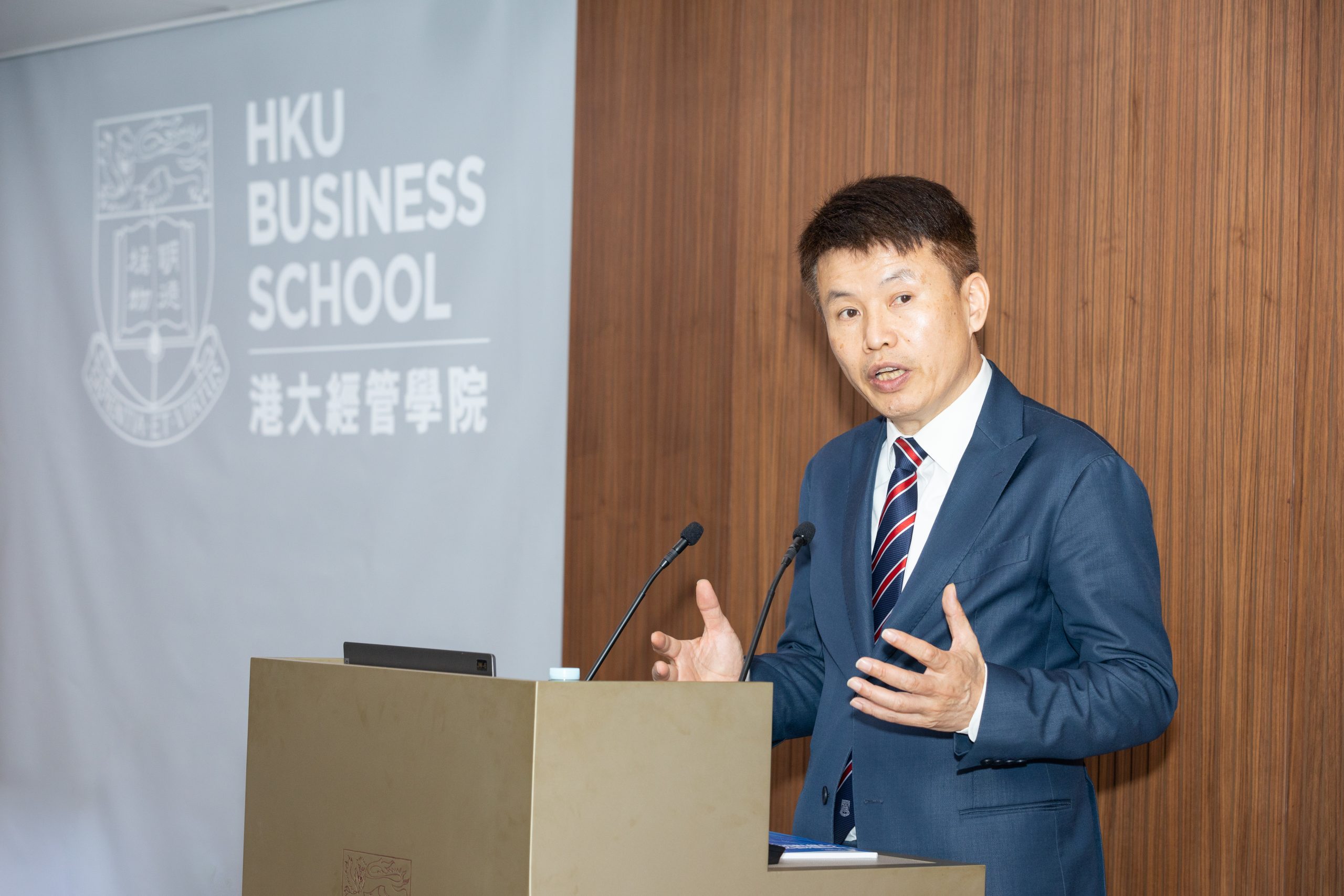
2. Professor Hongbin Cai, Dean and Chair of Economics of HKU Business School delivers a welcoming remarks.
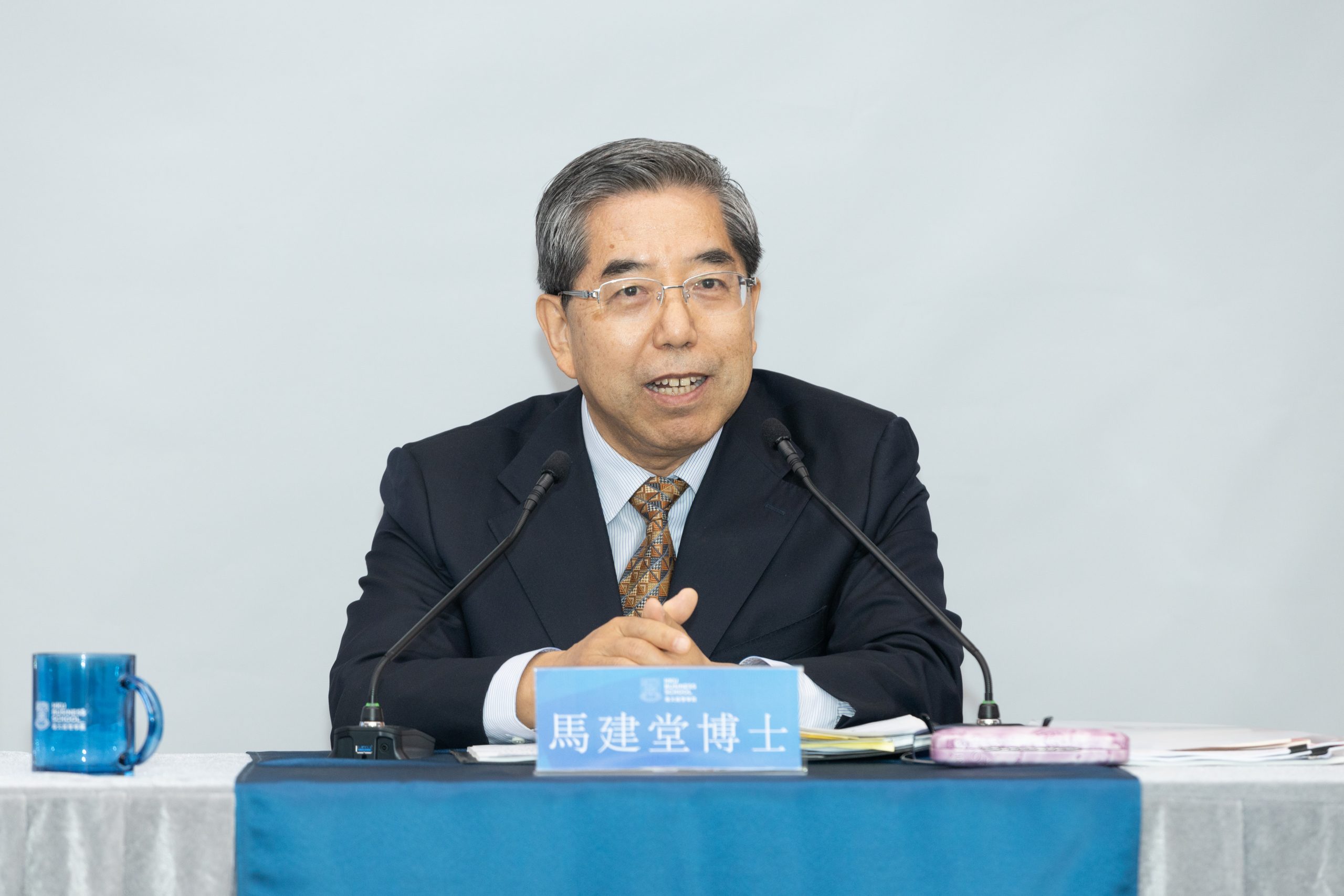
3. Dr Jiantang Ma, Standing Committee Member and Deputy Director of the Economic Affairs Committee of the Chinese People’s Political Consultative Conference, former Party Secretary and Vice President of the Development Research Center of the State Council, and former Director of the National Bureau of Statistics delivers a keynote speech.
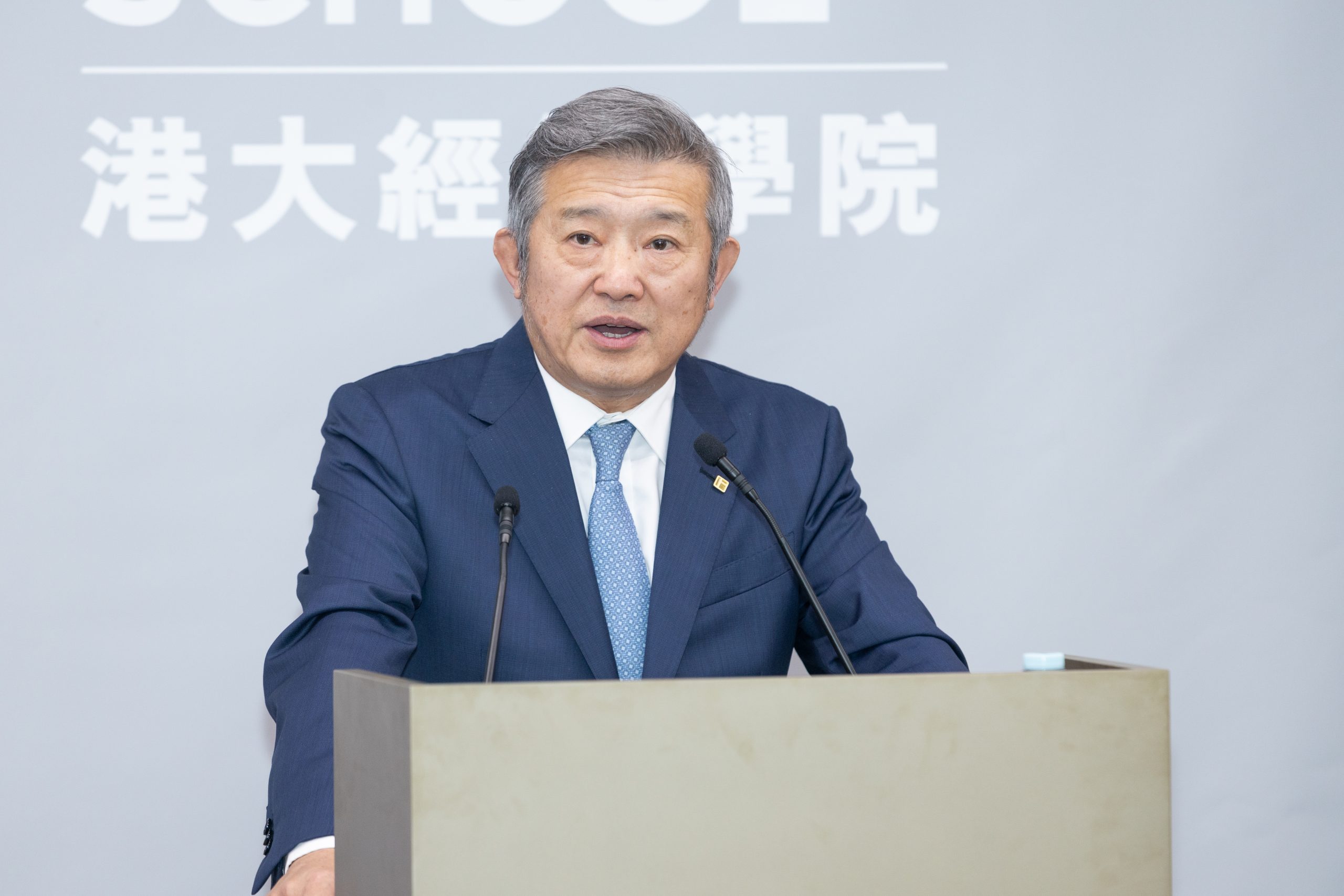
4. Dr Dongsheng Chen, Founder, Chairman and CEO of Taikang Insurance Group delivers a speech.
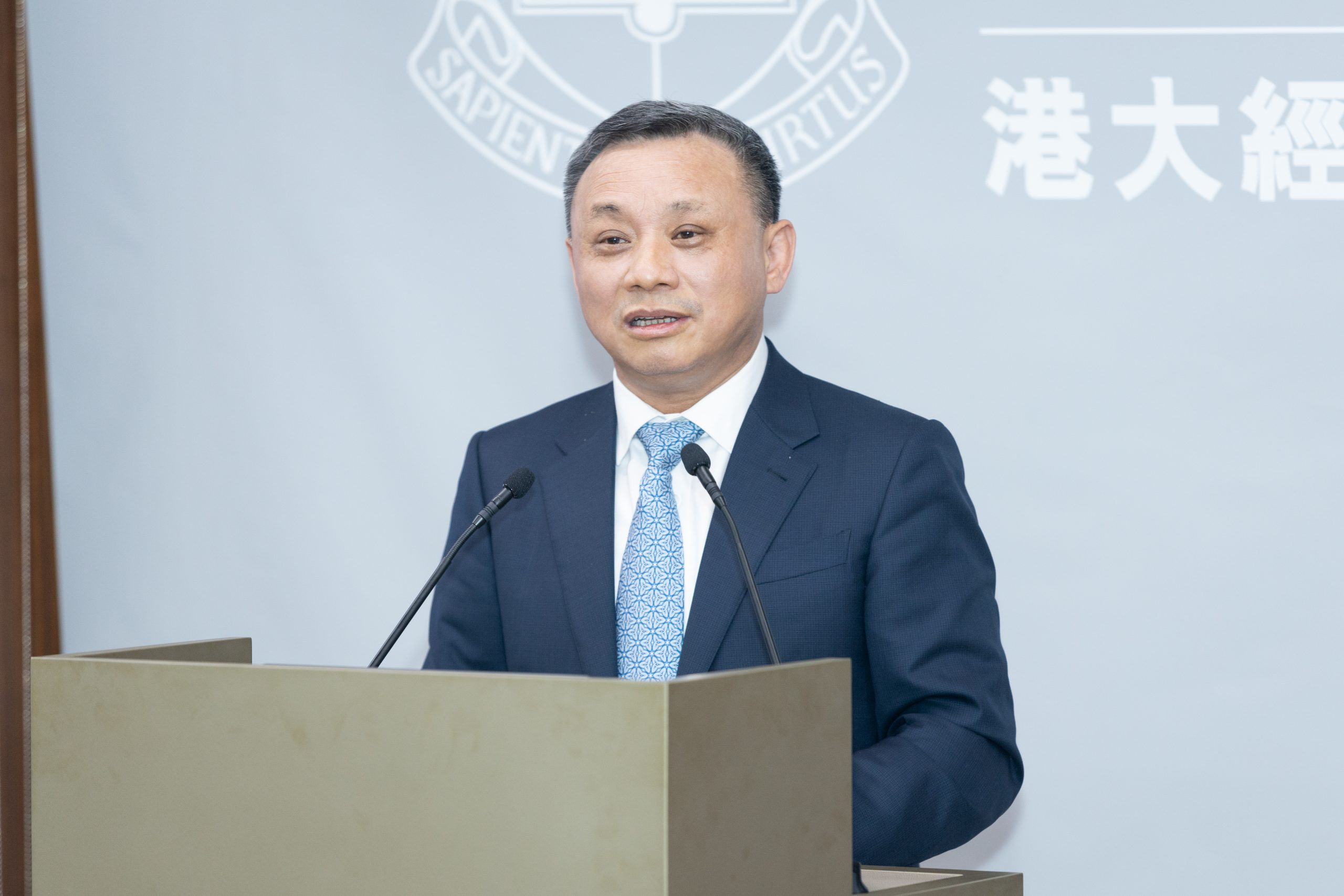
5. Professor Zhenhua Mao, Founder of ZhongChengXin (HK) Investment Services Limited, and Professor of Practice of HKU Business School delivers a speech.
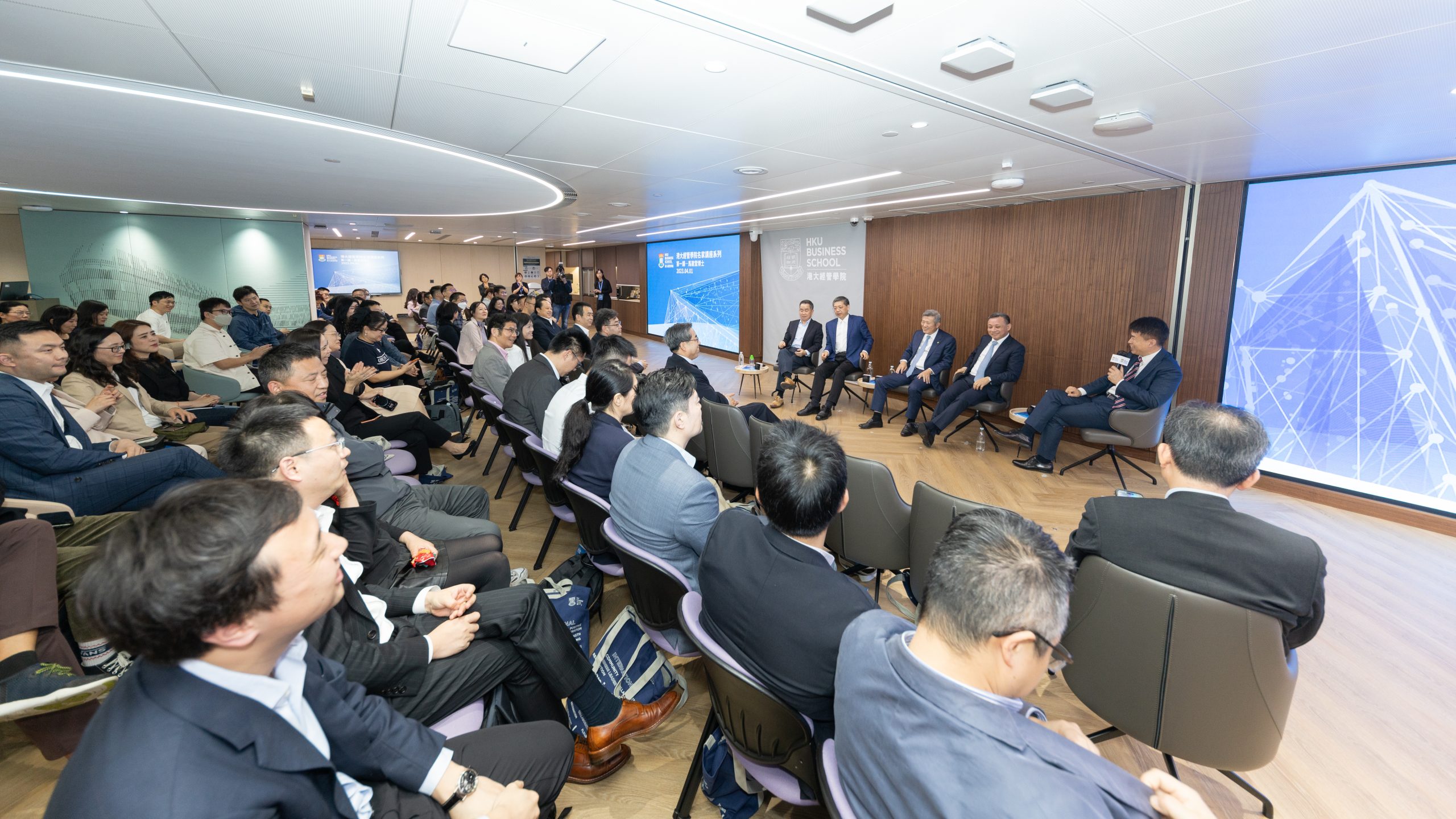
6. (From left) Professor Zhiwu Chen, Chair Professor of Finance, Cheng Yu-Tung Professor in Finance and Director of Hong Kong Institute for the Humanities and Social Science; Professor Shusong Ba, Managing Director and Chief China Economist of HKEX; Dr Dongsheng Chen, Founder, Chairman and CEO of Taikang Insurance Group;Professor Zhenhua Mao, Founder of ZhongChengXin (HK) Investment Services Limited, and Professor of Practice of HKU Business School; Professor Hongbin Cai, Dean and Chair of Economics of HKU Business School join the panel discussion.
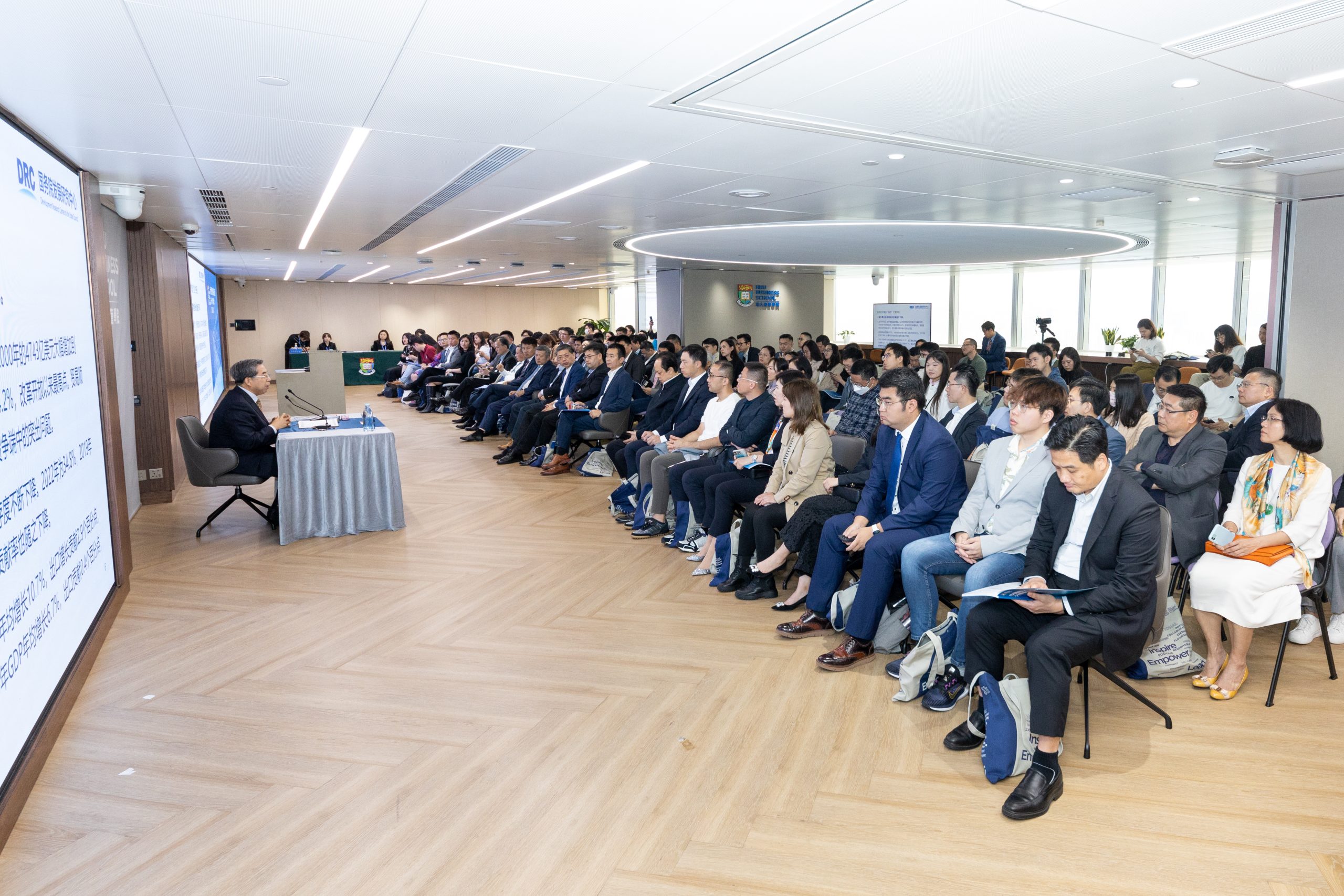
7. The lecture attracts a diverse audience of business leaders, academics, alumni and students.
Annex
- Considering the timing of peak of pandemic immunity, the pace of economic recovery and the influence of the base effect, when estimated using the trend decomposition method, economic recovery may exhibit an ‘N-shaped’ trajectory in 2023. That is, macro growth may be low in the first quarter and high in the second quarter. The average growth rate for the entire year is likely to reach 5.3%, significantly higher than the forecast in 2022.
- Assuming that there are no changes in science and technology and in institutions, the potential growth rate generally presents a downward trend. From the perspective of capital factors, the marginal return of capital input is decreasing and the growth rate of fixed asset investment in major economies is also declining. From the perspective of labour factors, all of the major economies show slowing population growth, ageing population, a decline in both labour participation rates and labour productivity growth. Data calculated using a filtering method shows that during the 14th Five-Year Plan period, China’s potential GDP growth rate may reach 4.8% on average, and may decline to 4.4% in 2025. In the medium to long term, the support line of China’s economic growth may also drop to 4%, down from 5.5% before the pandemic.
- The Chinese economy still varies widely among its population, between urban and rural areas and between regions. The problems involved in the process of economic and social development must be solved through rapid expansion of the ‘cake’. In this context, macro policies should adhere to the principle of development as the top priority and avoid excessive politicisation of social operations. With the given economic downward pressure, it is especially necessary to reiterate the principle of taking economic development as the central task and continue to position GDP growth as the most important assessment of government departments, to enhance government departments’ enthusiasm for developing the economy. Moreover, macro policies should focus on helping people recover from the pandemic, in view of the fact that micro entities have been severely harmed by the pandemic. China should increase spending on projects to improve its people’s well-being, to support and encourage private investment and business operations, to strengthen the micro foundation for steady and sustained economic growth and to unleash the potential for economic growth.
Review of China’s Financial System and its Prospects for 2023
- In 2023, the J-curve effect after the pandemic is expected to be relatively flat, but credit growth will be subject to the impact of the post-pandemic policy adjustments on the supply side and the expected slow recovery in the medium term. In the long term, the rise in the real estate cycle is expected to lead to a profound adjustment in financial expansion, urbanisation, and industrialisation models, which will be an important factor in China’s financial volatility in the future.
- Since 2020, the growth in China’s exports has continued to exceed market expectations, rising from 14% to 16%, and the contribution of net exports to China’s economic growth has remained at a fairly high level. In 2022, even when growth in exports had slowed down, the contribution of net exports to economic growth was 17.1%. At present, based on a cautious outlook for the global economy, the market expects China’s export growth to decline to approximately -2% in 2023, making a negative contribution to the economy. The direct impact on the financial sector would result from the passive tightening of liquidity in emerging markets because of falling exports and the Fed’s interest rate hikes, while the decline in exports would be reflected as a slowdown in real credit demand and liquidity cycles. This will create new challenges for financial policy in 2023.
China’s Economic Growth: Lessons and Future Challenges
- The main driver contributing to China’s economic growth from 1990 to 2007 is the growth in total factor productivity (TFP), instead of the increase in the investment rate. China’s future GDP growth depends crucially on its TFP growth. If there will be no TFP growth, then China’s GDP growth rate would average less than 3% a year between 2023-2035 even if the government increases the fixed-capital investment rate by half a percent each year. If the TFP will grow at 2%, however, even with a declining investment rate, China’s GDP growth rate would still average close to 5% a year between 2023 and 2035. If the TFP grows even faster, at 3% a year and the investment rate stays constant, China’s GDP growth can be maintained at around 6.77% a year without any slowdown between 2023 and 2035.
- Before 2007, China’s TFP growth rate averaged more than 4% a year because of economic reform and decentralisation that resulted in constant policy and institutional changes that often started from the bottom. Since 2007, the Chinese government has moved away from the bottom-up approach and emphasised more on policy design at the top and mobilising national resources (Ju Guo Ti Zhi). This approach may have achieved some short-term goals such as the growth recovery in 2010 after the global financial crisis and the rapid expansion of infrastructure projects, but at a great cost of economic efficiency. Without bottom-up policy reforms, China had poor TFP growth performance, with the TFP growth rate averaging 1% a year, much lower than the 4% achieved before 2007.
- In a recent press conference, Premier Li Qiang told the reporters that China should revitalise the entrepreneurial spirit of Zhejiang and Jiangsu provinces in the 1980s and 1990s which may signal a potential change away from the top-down approach of policy design and implementation and a return to the bottom-up policy changes that was so effective and successful in generating remarkable TFP growth in the 1980s and 1990s.
Chinese Youth Employment: Facts, Causes, and Solutions
- The youth (aged 16-24) unemployment rate in China has risen sharply during the COVID-19 pandemic. This increase may have significant long-term consequences on young workers even if the economy returns to normal. The structural factors that cause the increase in the unemployment rate include the financial constraints the companies face, the long-term productivity of the workers (e.g. firms increasingly replace people with machines and AI in routine tasks), the decline of the share of job positions available for fresh college graduates, the delay of retirement age and the increase in the number of fresh college graduates entering the labour
- Minimum unemployment rate is a proxy for the prosperity and growth of the economy. Given the size of the recent youth unemployment rate in China and its potential long-term consequences, policies that aim at helping young workers are clearly We recommend offering subsidies to firms to train and hire workers. In addition, the subsidies should favour firms with higher degrees of financial constraints and whose employees have higher returns on human capital investment.
- A natural concern to note is that, once firms receive subsidies, they may hire workers temporarily (for example through an internship), neglect investments in their human capital, and stop employing them once the internship is over. To mitigate the moral hazard problem of hiring, one possibility is to offer loans to firms for hiring, instead of using wage subsidies directly. As for mitigating the moral issue on training, one possible approach is to offer incentives to firms if the workers manage to get long-term employment from the firm.
Policy on the Environment, Climate Change, Carbon Peaking and Carbon Neutrality
- The national carbon market of China remains in its early stage of development, and there is much room for improvement. China will further explore marketisation and improve the system and market supervision mechanisms. First, the national carbon market is expected to continue to expand in the future, and industries such as cement manufacturing, steel and plate glass manufacturing may be the next to be included in carbon market. By that time, the national carbon market will cover more than 70% of the country’s carbon emissions. Second, learning from the construction of regional and international carbon markets, more types of carbon finance products are expected to be added to the national carbon market.
- The Interim Regulations on the Management of Carbon Emissions Trading policy and other related policies will be issued and implemented in 2023 to further standardise the accounting, verification and supervision systems of the national carbon market to enhance its trading activity. Finally, the withdrawal of NEVs and new-energy power generation subsidies are projected to drive China to achieve its CO2 emission reduction targets while maintaining high-quality industrial and new energy development.
- China should improve its carbon pricing mechanism while its carbon peaking and neutrality policies should focus more on production and try not to restrict consumption. Moreover, it is recommended that China should improve its environmental protection and governance capacities and enhance public engagement, as well as focus on the cost-shifting of climate change policies and associated social equity issues. China shall play a more active role in a carbon-neutral global economy.
Taking history as a mirror: The COVID-19 pandemic and China’s post-pandemic investment and growth
- In response to the COVID-19 pandemic, China’s entrepreneur confidence index plunged from around 124 to 91 at the beginning of 2020. Once China curbed the pandemic in 2020–2021, entrepreneur confidence improved, but it began to weaken when the pandemic resurged in the second half of 2021. Local government policies during the pandemic had a tremendous impact on investor confidence. Therefore, it is a top priority to stabilisethe expectations of entrepreneurs to ensure the continuity of central and local policies and policies must prioritise boosting investor confidence, particularly the confidence of SMEs.
- Chinese consumer confidence was much harder hit at this time than during the 2008 financial crisis. The consumer confidence index plunged to below 90, from around 120 in 2021. By the end of 2022, the last point for which data are available, consumer confidence had only edged up to slightly over 90. Policy should shore up consumer confidence to boost demand, stimulate economic growth, and reinforce businesses’ willingness to invest. This is particularly important given the new export restraints resulting from deglobalisation. One near-term solution is to issue consumption vouchers, near-term consumption loans, and education loans. Conditions permitting, the Chinese government should further reform medical care and elder care in the medium and long term to boost consumer confidence.
- Moreover, investment frictions and costs, particularly for SMEs, must also be lowered. Businesses should be granted direct access to credit loans. This will reduce business investment costs and financial restraints, thereby spurring fixed asset investment. Medium- and long-term policies should focus on building industrial supply chains and regional industrial clusters to reduce business investment and production costs. This will improve businesses’ economic resilience, making them better able to cope with economic shocks and achieve stable long-term economic development.
Boosting Entrepreneurs’ Confidence to Restart China’s Post-pandemic Economy
- According to a survey conducted in 2022 and follow up visits in 2023, there is an increase of surveyed entrepreneurs on the investment plan for 2023, indicating their increased confidence following the pandemic. Between the main survey and the follow up survey, the proportion of the entrepreneurs who were concerned about Western sanctions decreased from 100% to 70% while the proportion concerned about the deterioration of the ecological environment decreased from 80% to 36%. The proportion concerned about employment, an economic downturn and the intensification of social conflict also decreased.
- However, the proportion of entrepreneurs worrying about significant inflation increased from 13% to 43% and the proportion worrying about disasters triggered by war or terrorism jumped from 0.3% to 43%. There was a small increase in the proportion of entrepreneurs worrying that the real estate bubble would burst. These findings reflected significant post-pandemic psychological changes among entrepreneurs: they were less worried about the ongoing downturn of the overall climate but more worried about the impact of certain emergencies.
- In order to increase confidence among entrepreneurs and in the private sector to bolster China’s economic recovery, the following policies are suggested: deepening reform and increasing economic liberalisation to provide greater economic autonomy; adopting a friendly attitude and easing tension with the West to reduce entrepreneurs’ perception of the risks of sanction; and improving entrepreneurs’ perceived political status by increase their political involvement, listen more closely to their voices when making policies, and increase policy support for enterprise development.






